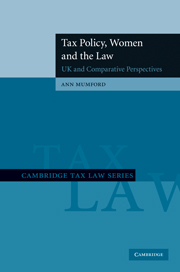Book contents
- Frontmatter
- Contents
- Acknowledgements
- Table of authorities
- 1 Introduction
- 2 What is tax policy?
- 3 Tax policy in action: gender budgeting
- 4 Corporate social responsibility and the possibility of common aims
- 5 Tax policy in context
- 6 Tax policy applied
- 7 Tax policy in systems revisited: families, tax law and the interaction of institutions
- 8 Putting into the system: gender, markets and tax policy
- 9 Conclusion
- Bibliography
- Index
1 - Introduction
Published online by Cambridge University Press: 06 December 2010
- Frontmatter
- Contents
- Acknowledgements
- Table of authorities
- 1 Introduction
- 2 What is tax policy?
- 3 Tax policy in action: gender budgeting
- 4 Corporate social responsibility and the possibility of common aims
- 5 Tax policy in context
- 6 Tax policy applied
- 7 Tax policy in systems revisited: families, tax law and the interaction of institutions
- 8 Putting into the system: gender, markets and tax policy
- 9 Conclusion
- Bibliography
- Index
Summary
Scope and methodology
The taxation system cannot solve the problem of women's economic inequality. There is a view that to deploy tax law for any instrumental purpose somehow detracts from its purity and causes it to function less well as a system of tax law. The project of this book is to argue, within the constraints of the first observation, that the second observation is not correct and that the tax system should be deployed to militate against economic discrimination against women.
This book hopes to reflect its topic, and to locate itself at the intersection of ideas, disciplines and scholarship. A wide range of sources is considered. Writers who have challenged and formed traditional economic thought are consulted. For example, Karl Polanyi's writings are investigated, to discern whether his advocacy of a cultural approach to economics holds promise for the subject of women and tax. Additionally, Schumpeter's efforts to inform economic theories with sociological perspectives structure several of this book's investigations into the fiscal state. Their projects, in particular, are important because of the nature of the interaction between women and tax law. The problem of women's economic inequality is universal, and cannot be solved by tax law, in any state, or through any tax-based international agreement. There is no solution in fiscal legislation which, on its own, will help women who live in poverty to find a route to a life with more resources.
- Type
- Chapter
- Information
- Tax Policy, Women and the LawUK and Comparative Perspectives, pp. 1 - 12Publisher: Cambridge University PressPrint publication year: 2010

